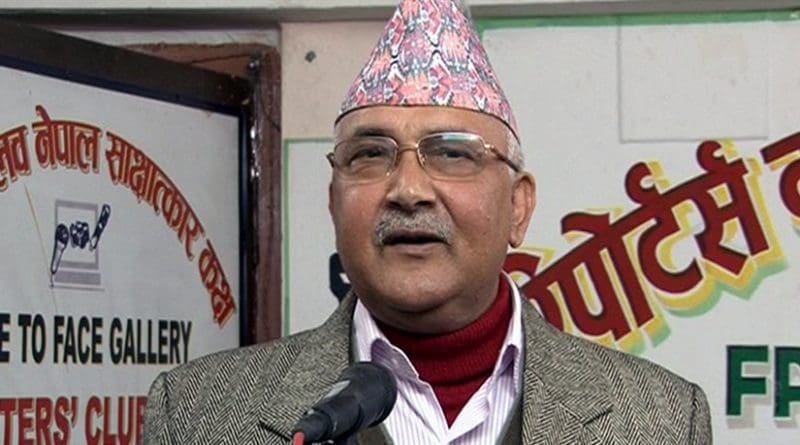Nepal: ‘A Summer Of Protests,’ Does PM Oli Care? – Analysis
By SAAG
By Dr. S. Chandrasekharan
This summer, Nepal is seen to be witnessing protests on various issues all of the Government’s own making.
The first was the Media Council Bill which is still attracting a large number of protests. There has been no attempt by the government to explain the Government’s stand. (We have a paper on this)
Then came the advertisement in the Public Service Commission calling for filling up of vacancies of over 9161 local government posts- a responsibility over which the centre has no moral jurisdiction when the States are mandated to do so under the Constitution. This is being done without even ensuring proper quota under the reservation scheme. No doubt the States and particularly the Madhesi groups are up in arms.
Then there is the Guthi Samsthan bill by which the Government ,wants to nationalize the Guthi properties and bring them all under a National Commission- a project the Government had been planning since last November. There was no hurry to take over the Guthi functions done by private institutions under proper checks and there have been no complaints of misappropriation or misuse. Guthis are socio-economic Institutions to fulfill religious, public and cultural functions. Yet the the Government was in a hurry to upset the powerful Newar Community of the valley who allege that it is a direct assault on their cultural heritage!,
Then there is the controversial NHRC bill as well as the Transitional Justice Bill. It looks that the government is in no hurry to deal with the transitional justice and the members of Commission are yet to be appointed! Despite repeated calls, the Chand group has refused to come to the negotiating table. Recently there was a scare that the group was planning a major attack near Solakhumbu!
The current situation was aptly described by the Editor of the Kathmandu Metro,
Siddhi B. Ranjitkar and it is worth quoting- “The current Cabinet Ministers had been very successful to provoke the common folks into protests rather than doing some beneficial work.”
This is very true.
Where was the hurry to begin this so called clean-up of the Guthis? Why were the water cannons used against peaceful demonstrators in Kathmandu?
One Hari Sharma, a political analyst has given three reasons for the spate of protests this summer.
One was the failure of the Government in not fulfilling the expectations of the people. Second was the “Electoral arrogance” of the ruling party which thinks that with a two third majority it can do whatever it likes. And third, is the absence of any dialogue between the Government and the civil society.
On the last one, more than anything else it is the style of working of PM Oli that is irritating many other leaders and of course the weak and helpless opposition. He is said to be sarcastic and acerbic and does not make any effort to reach out to the civil society. It is no wonder that the cabinet ministers also do the same.
Added to this is the failure of the only opposition Party, the Nepali Congress to make any meaningful impact on the Government. By going through the media, one is not sure what the stand of the Nepali Congress is on the contentious issues mentioned earlier. Do they have an opinion at all? One is not sure!
One issue that is going to become a major point of confrontation is the Federal- Provincial Relations. The recent decision of the Federal Government directing the Public Service Commission to fill up the vacancies of the local governments in the provinces without provision for reserved seats is a direct violation of the spirit of federalism. This is being done when Province number 2 had already written to the Public Service Commission not to go ahead with the recruitment as it is their responsibility and not that of the federal Government. Province number 5 has already passed a law for the formation of a Public Service Commission for such recruitment.
The Minister for Internal Affairs and Law, Hari Bahadur Chuman, a member from the Ruling Party openly said that the Central Government is the biggest hurdle towards implementation of federalism. He urged the Centre to do everything to protect the system achieved after a long struggle and sacrifice.
The two parties from the Terai are also said to be opposed to the recruitment but the Government is said to be bent upon doing the recruitment. It is sheer arrogance of the Federal Goverbment and nothing else!
The root problem appears to be that PM Oli and his former UML Colleagues are yet to reconcile themselves with a federal system where the powers are shared. It is their mindset that the provincial and local Governments are not separate entities but part of the federal system that is causing all the problems!
There are also differences within the UML and the Maoist components of the now merged Nepal Communist Party. It is said that way back in 2016 itself, Oli had admitted that he had accepted federalism and inclusiveness at Dahal’s insistence. This was confirmed by Dahal that he had “dragged” Oli and his party colleagues to federalism and republicanism.
If this is true, one can now understand the reluctance of Oli in truly implementing the federal character of the Constitution. While every attempt will be made by Oli to at least delay the implementation of the system, there will be repercussions not only from within his own party ranks but also from the Madhesi parties.
A two third majority alone will not be enough to solve the problems being created willfully by Oli and his cabinet colleagues.
Nepal should now brace for a series of protests both in the valley and outside thanks due to the incompetence of the leaders.

